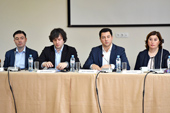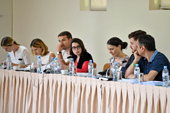
Election working group meets after ruling party allows proportional elections for 2020
By Gvantsa Gabekhadze
Tuesday, July 9
The working group composed of members of the ruling party and the opposition held a meeting on Monday for the first time after the Georgian Dream ruling party accepted the proportional representation system for the upcoming, 2020 parliamentary race amid public protests in Tbilisi.
The first day of the working meeting discussed the OSCE/ODIHR election recommendations provided after last year’s presidential elections in Georgia.
“We need to use this day to discuss all OSCE recommendations and give the floor to every party concerned express their positions and offers. Then, we will agree on the key issues for the next meeting,” Parliament Speaker Archil Talakvadz said.
Talakvadze thanked the US Government, US Agency for International Development and the International Foundation for Electoral Systems for support to the working process.
“This engagement makes me hopeful that we will adopt the changes through the maximal concentration, cooperation, and result-oriented process. Despite that the attention of the society has been recently directed to other issues, I being the speaker, would like to underline that the electoral system change and the election law reform in a long term run is paramount as for the political system, so for the society and the country,” Talakvadze said.
Talakvadze stated that the position of the ruling party is to ensure engagement of political parties in the working processes and “thus, we expressed our commitment to inviting the political parties to the discussion,” Talakvadze said, responding to the address of opposition parties to increase the number of political players in the group.
The reason named for the enlargement of the format was that the Ruling party offered proportional elections with a zero threshold for 2020 parliamentary elections, which” gives a chance to many parties take seats in the 150-member parliament.”
Moving to the fully proportional elections from 2020, which should have been introduced from 2024, was one of the demands of demonstrators in Tbilisi, who took to the streets after Russian MP Sergey Gavrilov, from the occupant country, was allowed to take high tribune in the Georgian parliament building on June 20.
The final report by the OSCE Office for Democratic Institutions and Human Rights (ODIHR) on October 28 and November 28 2018 presidential election in Georgia [released in February 2018] recommended a comprehensive review of the election legislation in order to eliminate gaps and ambiguities and ensure uniform application.
The report noted that the use of negative, harsh and at times violent rhetoric significantly overshadowed the campaign, particularly for the second round, and went unaddressed by the authorities. “Enhancing regulations on acceptable speech during election campaigns would allow reviewing potential cases of hate speech and, where appropriate, applying sanctions on time,” the report said.
The report further recommended establishing an effective and timely mechanism for addressing complaints on cases of misuse of state resources during the campaign before an impartial and competent authority, to ensure a clear separation between party and state.
Additional recommendations included aligning the number of commission members at each level to the actual need, introducing expedited deadlines to address campaign finance violations, making all decisions and legal opinions of the media regulator publicly available, reviewing the legal framework for election dispute resolution and ensuring that voters cast their ballot free of the fear of retribution.
Georgia has a mixed electoral system with 77 seats in its 150-member parliament allocated under the party-list among parties or electoral blocs which overcome the 5 percent threshold.
The remaining 73 MPs are elected in 73 single-member districts, and the winning candidate has to receive more than 50 percent of votes to win the race.


